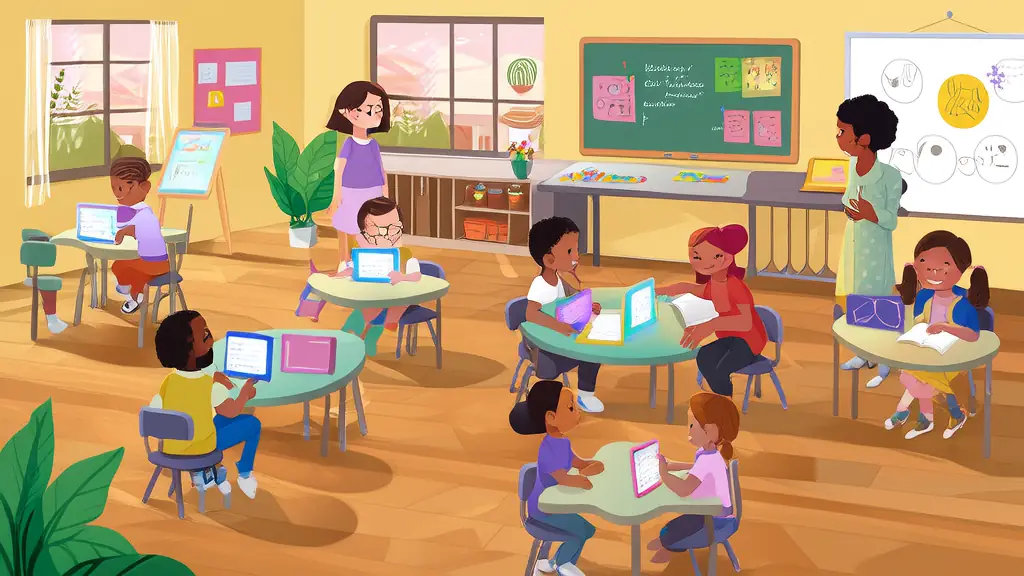
www.uitgedu.com | 自然英语拼读 | KET | PET | 英语点读学习资料
Empowering the Next Generation: Navigating K-12 Education in 2025
Welcome to a new era of learning, where traditional boundaries are being redefined, and innovative approaches are paving the way for more effective and engaging educational experiences. As we stand at the cusp of a transformative period in K-12 education, it's crucial for parents and educators to stay informed about the latest methodologies, child development insights, and technological advancements that can shape the future of our children. In this blog post, we will explore how these elements are coming together to create a more dynamic and supportive learning environment, backed by real-world success stories and practical tips.
Latest Teaching Methodologies and Their Effectiveness
In recent years, there has been a significant shift towards more student-centered and experiential learning approaches. One such methodology is Project-Based Learning (PBL), which encourages students to engage in hands-on projects that require critical thinking, collaboration, and problem-solving. Studies have shown that PBL not only enhances academic performance but also boosts long-term retention and real-world application of knowledge. For instance, a high school in California implemented a PBL curriculum, resulting in a 30% increase in graduation rates and higher college acceptance rates among its students.
Another promising approach is Flipped Classroom, where students review lecture materials at home and use class time for interactive activities, discussions, and personalized guidance. This method has proven particularly effective in subjects like math and science, where students benefit from immediate feedback and collaborative problem-solving. A case study from a middle school in Texas reported a 25% improvement in math scores after adopting the flipped classroom model.
Child Development Insights and Research
Understanding child development is key to tailoring educational experiences that meet the unique needs of each student. Recent research highlights the importance of social-emotional learning (SEL) in fostering well-rounded individuals. SEL programs, which focus on self-awareness, self-management, social awareness, relationship skills, and responsible decision-making, have been shown to improve academic outcomes, reduce behavioral issues, and enhance overall well-being. For example, a longitudinal study in New York found that schools with comprehensive SEL programs saw a 20% reduction in disciplinary incidents and a 10% increase in standardized test scores.
Additionally, the role of play-based learning in early childhood education has gained renewed attention. Play is not just fun; it is a powerful tool for cognitive, physical, and social development. Kindergartens that incorporate play-based activities have reported better language skills, creativity, and emotional regulation among young learners. A preschool in Minnesota adopted a play-based curriculum, leading to a 15% increase in language proficiency and a 20% improvement in social interaction skills.
Educational Technology Trends
The integration of technology in K-12 education has revolutionized the way students learn and teachers teach. Adaptive Learning Platforms are one of the most impactful trends, using algorithms to personalize content and pace based on individual student needs. These platforms provide real-time data and analytics, enabling teachers to identify and address learning gaps more effectively. A school district in Florida implemented an adaptive learning system, resulting in a 35% increase in reading and math proficiency among its students.
Virtual Reality (VR) and Augmented Reality (AR) are also transforming the educational landscape by creating immersive and interactive learning experiences. VR and AR can bring historical events, scientific concepts, and cultural experiences to life, making learning more engaging and memorable. A high school in Illinois used VR to teach history, and students showed a 40% improvement in retention and a 25% increase in interest in the subject.
Practical Tips for Parents and Teachers
For parents and teachers looking to support and enhance their children's learning journey, here are some actionable tips:
- Stay Informed and Involved: Keep up-to-date with the latest educational trends and research. Attend parent-teacher conferences, participate in school events, and engage in ongoing dialogue with your child's educators.
- Encourage Curiosity and Exploration: Foster a love for learning by encouraging your child to ask questions, explore new interests, and engage in hands-on activities. Create a supportive home environment that values curiosity and discovery.
- Promote Social-Emotional Learning: Help your child develop essential social and emotional skills through open communication, empathy, and positive reinforcement. Consider enrolling them in SEL programs or activities that promote teamwork and self-awareness.
- Leverage Educational Technology: Utilize educational apps, online resources, and digital tools to supplement and enhance your child's learning. Ensure that screen time is balanced and purposeful, and monitor progress regularly.
Conclusion: A Call to Action
As we navigate the ever-evolving landscape of K-12 education, it's clear that a combination of innovative teaching methodologies, a deep understanding of child development, and the strategic use of technology can significantly enhance the learning experience. By staying informed, involved, and supportive, parents and educators can play a pivotal role in empowering the next generation of learners. Let's work together to create a future where every child has the opportunity to thrive and succeed.
Join the conversation! Share your thoughts, experiences, and ideas in the comments below. Together, we can make a difference in the lives of our children and the future of education.